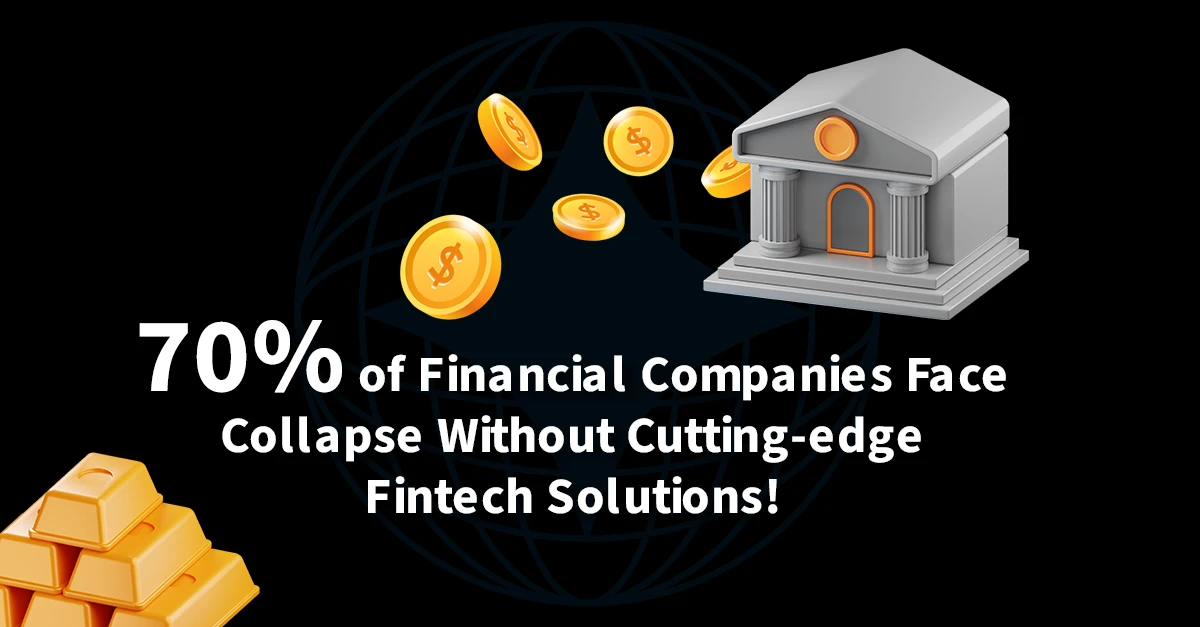Schedule a FREE call with our outsourcing expert now and get a precise quotation that meets your requirements. Don't wait - get started today!
In today’s fast-paced digital economy, the financial industry relies heavily on technology to offer services that meet consumer expectations and remain competitive. This is where the role of a fintech software developer becomes essential.
Businesses can leverage cutting-edge technology to build robust, secure, and user-friendly financial applications by partnering with a skilled fintech software developer. Whether it’s payment processing or streamlining financial services, these developers offer tailored solutions that drive innovation and business growth.
According to research, the global fintech market is projected to grow to $514.9 billion by 2028, with a compound annual growth rate (CAGR) of 25.18%. With such rapid expansion, financial institutions must stay ahead by employing innovative technology solutions, and fintech software developers are the driving force behind that transformation.
What Does a Fintech Software Developer Do?
A fintech software developer specializes in creating software solutions for the financial industry. They combine their expertise in technology with an understanding of financial systems to develop applications that meet the specific needs of banks, insurance companies, and other financial service providers.
Whether it’s creating secure payment gateways, designing intuitive user interfaces, or ensuring compliance with regulatory frameworks, fintech software developers help businesses stay ahead in the competitive financial landscape.
Their work spans the entire software development life cycle (SDLC), from initial planning and design to coding, testing, deployment, and ongoing maintenance. By focusing on security, efficiency, and user experience, fintech software developers ensure that financial software is reliable, scalable, and user-friendly.
Why Is Fintech Software Development Critical for Financial Services?
The financial services industry is increasingly dependent on digital solutions, especially as customer expectations shift toward seamless, mobile-first experiences. As financial institutions adapt to this shift, they face several challenges, including cybersecurity, regulatory compliance, and integration with existing systems. A fintech software developer helps tackle these challenges by developing secure and compliant software that ensures smooth operations.
Moreover, the financial sector is highly regulated, and compliance is non-negotiable. Banks and financial service providers need to meet strict regulatory requirements, such as the Payment Card Industry Data Security Standard (PCI DSS) and the General Data Protection Regulation (GDPR).
A fintech software developer ensures that the financial applications they build not only offer innovative features but also comply with these regulations. In addition, fintech software developers are essential for integrating new technologies, such as blockchain and AI, which are becoming integral to modern financial services.
Innovative Financial Solutions Built by Fintech Software Developers
Payment Processing Solutions
Payment processing has become a critical component of financial services as businesses and consumers demand faster, more secure payment methods. Fintech software developers build reliable payment processing systems that accommodate credit cards, mobile payments, and other digital transactions. With secure encryption protocols and real-time processing, these systems offer both security and convenience.
The growth of digital payments is staggering. By 2027, digital wallets are expected to account for over 52% of e-commerce transactions worldwide. This shift toward digital payments highlights the need for fintech developers to build payment solutions that are not only fast and reliable but also secure from potential cyber threats.
Financial Apps
Whether it’s personal finance management or mobile banking, financial app developers play a significant role in creating solutions that enhance user experience. A well-designed financial app not only helps businesses reach more customers but also offers a seamless experience that keeps users engaged. By integrating features like budgeting tools, real-time notifications, and easy transfers, fintech app developers ensure that financial services are always at the users’ fingertips.
Mobile banking usage has significantly increased, showing how important a strong mobile presence has become for financial institutions. In addition, mobile banking users frequently check their accounts, which means that banks must offer smooth and secure mobile platforms. Fintech developers ensure that these apps meet strict security requirements, addressing concerns about fraud and data breaches.
Investment and Wealth Management Platforms With the growing popularity of automated investment platforms and robo-advisors, fintech developers are tasked with creating solutions that can analyze vast amounts of data and provide personalized investment recommendations. These platforms use machine learning algorithms to assess risk tolerance, monitor market trends, and execute trades on behalf of users, making investment more accessible to a broader audience.
Robo-advisors are projected to grow over $2,334.00 billion in assets by 2024 – 2028, reflecting the increasing demand for these automated platforms. Fintech software developers build these systems to provide transparency, accessibility, and low fees, which attract a new generation of investors.
Blockchain and Cryptocurrencies
Blockchain technology is revolutionizing the financial services industry by offering a secure, transparent way to conduct transactions. Fintech software developers are instrumental in building blockchain-based platforms that facilitate secure cryptocurrency transactions, decentralized finance (DeFi) applications, and digital asset management. Developers are at the forefront of this transformation. In addition to cryptocurrencies, blockchain technology is being used for various financial services, including cross-border payments, smart contracts, and identity verification. Fintech developers play a key role in making these technologies practical for everyday financial applications.
Regulatory Compliance Solutions
Navigating the complex landscape of financial regulations is one of the biggest challenges for financial institutions. Fintech software developers create tools that help businesses remain compliant with regulations such as the General Data Protection Regulation (GDPR) and the Payment Card Industry Data Security Standard (PCI DSS).
These tools automate processes such as data encryption, transaction monitoring, and reporting, reducing the risk of non-compliance and associated fines. For example, automated compliance software can reduce compliance costs while significantly lowering the risk of human error in regulatory reporting. This makes fintech solutions invaluable to businesses that operate in the heavily regulated financial industry.
The Role of UX Designers in Financial Software Development
Creating financial software isn’t just about functionality; it’s also about user experience. This is where UX designers come in. By working closely with fintech software developers, UX designers ensure that financial applications are not only efficient but also easy to use. Whether it’s simplifying complex financial transactions or making interfaces intuitive for users of all ages, UX design plays a crucial role in the success of financial apps.
A good example of this is case studies showing how improved UX design has led to significant increases in app usage for some financial institutions. This highlights the importance of a seamless user experience in driving customer engagement. Effective UX design not only enhances customer satisfaction but also reduces the need for customer support and drives overall efficiency.
Case Studies: Successful Fintech Software Development Projects
One notable case study involves the development of a mobile banking app for a mid-sized bank. The fintech software developers worked with the bank to integrate mobile check deposits, account management, and real-time notifications into a single platform. As a result, the bank experienced a significant increase in mobile transactions shortly after the app’s launch.
Another case involves payment processing software developed for an e-commerce platform. By integrating secure, real-time payment processing capabilities, the platform experienced a 40% reduction in payment failures and a 20% increase in customer retention. This illustrates how fintech software developers contribute to improved business performance by optimizing payment solutions.
Choosing the Right Tech Stack for Fintech Software Development
Selecting the right technology stack is essential for creating efficient, scalable, and secure financial applications. A typical fintech tech stack includes programming languages like Python, Java, and C#, along with databases like MySQL and PostgreSQL. These technologies are known for their reliability, scalability, and security, making them ideal for financial software development.
In addition to traditional technologies, many fintech solutions are now built using cloud computing platforms such as Amazon Web Services (AWS) or Microsoft Azure. Cloud infrastructure allows financial institutions to scale their operations quickly, improve collaboration, and protect sensitive data with advanced security features.
Challenges in Fintech Software Development
While fintech software development offers many opportunities, it also comes with its challenges. Cybersecurity remains a top concern, as financial institutions are prime targets for hackers. A study found that cybercrime costs the financial sector an average of $18.3 million per year. This makes it imperative for fintech developers to prioritize security in every stage of the software development process.
Another challenge is the fast pace of technological advancements. Fintech software developers must constantly update their skills and stay informed about the latest trends, such as blockchain, artificial intelligence, and machine learning. This ensures that the solutions they develop remain relevant in an ever-evolving industry.
Unlock Business Growth with Expert Fintech Software Development from Magellan Solutions
In today’s digital age, hiring a fintech software developer is essential for businesses in the financial sector. From payment processing and regulatory compliance to creating intuitive mobile apps, these developers provide the technical expertise needed to build innovative financial solutions. At Magellan Solutions, we specialize in providing tailored software development services that help financial institutions stay ahead of the competition.
Unlock your business potential with us! Book your FREE 60-minute business consultation today, and let’s strategize how to elevate your operations—NO COMMITMENTS, just results-driven insights!
















